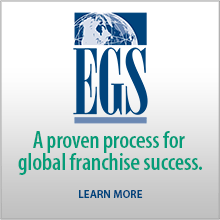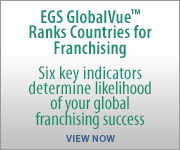The Fastest 2 Minutes in International Franchising
Our GlobalTeam™ of highly experienced international specialists in the USA and on the ground in 32 countries contributed to this summary of today’s world business opportunities. Countries to watch for excellent business development opportunities in 2017: the Philippines, the UAE, Spain and Poland.
| Asia | China Japan Malaysia The Philippines Thailand Viet Nam |
Consumer economy growing at over 8% per year Corporations are seeking consumer investments Political and currency unrest Many new US international businesses opening Starting a comeback from post-coup recession 6%+ GDP growth, USA franchises desired |
| Americas | Argentina Brazil Canada Chile Colombia Mexico Peru USA |
Dramatic change, new government, improving economy Economy, stalled, inflation up, government problems New tax-focused government Government regulations increased Uneven growth, low new investment Post US election new investment stoppage New pro-business government, US brand friendly Renewed business confidence: lower taxes, regulations |
| Europe | Ireland Germany Poland Russia Spain Turkey United Kingdom |
Good GDP growth, slow to see new investment Difficult to find investors for foreign brands Highest EU GDP growth Not now!!! Recovery speeding up, heavy new investment Political unrest and terrorism = no new investment BREXIT & election fallout slowing new investment |
| Middle East | Egypt Saudi Arabia United Arab Emirates |
Security and hard currency problems Difficult to get new businesses open once built New US brands entering, strong new investment |
| Elsewhere | Australia India New Zealand South Africa |
Challenge to find investors for foreign brands Challenge to find licensees who follow system Few consumers, but pro foreign brands High unemployment (25%), low new investment |
Keeping ahead of the wars, economic meltdowns, and political disasters
One of our jobs for our U.S. clients is to look two to three years ahead, figure out where wars will raging, where economic meltdowns will be occurring, and where political disasters are looming – then take our clients elsewhere!
The key to successful international business is constant monitoring of the economies around the world and being ready to move quickly to higher potential and calmer countries.
Why do we need to do all this? Our company exports U.S. franchise brands.
We act as an outsourced international development department for brands such as Build-A- Bear Workshop®, Denny’s®, International Dairy Queen, Lawry’s® The Prime Rib, Massage Heights®, Everlast Fitness® and Mosquito Squad®. One of our primary tasks is helping the brands prioritize the countries they enter, focusing on countries that have the highest ROI potential for the specific brand.
Recently, the CEO of one of the brands we work with told me that our job was to look two to three years ahead, figure out where the wars will be and take them elsewhere.
It turns out this is just a little bit funny – while at the same time being quite serious.
I would restate this to looking two to three years ahead not only to determine the potential for war, but also the potential for economic meltdowns and political disasters.
This is important due to the fact that it can take two to three years to find and sign a country licensee, and then another one to two years to get the first unit of the franchise open in a country.
How do we do this? Research, research and more research.
We subscribe to 25 international business data and analysis sources. We have team members on the ground in 32 countries. And our US-based executive team collectively has 120 years of international experience living and working in over 69 countries. We have a full time Director of Research who monitors our sources and watches for trends.
That being said, there are still ‘exciting’ events that change the potential for finding investors in a target country that are ready and willing to make the new investment required to acquire the license of one of our U.S. franchise brands.
Two examples are the recent United Kingdom Brexit vote and the disintegration of Turkey as a place to do business.
No one really thought about what the consequences of actually voting to leave the European Union would be. Now we are beginning to see consequences – and all is not good. Where were the adults when this was happening?
I lived in Turkey in the mid 1980s and it was a great place to reside and to work. It was the world’s only secular, Muslim democracy. Turkey had a female Supreme Court judge before the USA, and a female Prime Minister in the 1990s. Over the past 10 years, things have gradually changed, and now Turkey is no longer secular and it is not really a democracy. The Ottoman Sultan seems to have returned after 100 years. The rapid GDP growth rate is being replaced with the rapid growth of inflation. In recent weeks, inward investment has stopped, and Turkish business people are not making any new investments. Our company has closed our office in Istanbul.
On the other side of the coin is Argentina. For several decades this country has been run by poor governments that defaulted on international loans and paid foreign franchisors their royalties in soy beans. Early in 2016 a new and radically different government came into power. In a matter of a few months they settled the long standing debt problem and made the local currency float free against the dollar. New inward investment is staggering as this first world country with a highly educated population is starved for new products, services and brands. We have started marketing U.S. franchise brands in Argentina for the first time since the mid 1990s. As a local business person told me, “The U.S. dollars have come out of the Argentinean mattresses for the first time in decades.”
At the end of the day we have learned that constant research is key to looking ahead. We have also learned that there will always be surprises. The key to successful international business is constant monitoring of the economies around the world and being ready to move quickly to higher potential and calmer countries.
EGS publishes research projects related to global business development, most notably the GlobalVue™ franchise country ranking, which has been published quarterly since 2001. The latest version of this country ranking tool can be downloaded at the following link: EGS-Dual-GlobalVue-0716.pdf
William Edwards, CEO of Edwards Global Services, Inc., has 40 years of international business experience. He has lived in 7 countries, worked on projects in more than 60, and has advised more than 50 U.S. companies on international development. Contact him at +1 949 375 1896, bedwards@edwardsglobal.com, or read his blog at Geowizard.biz
A version of this blog first appeared In the Fall 2016 edition of the International Executive Resources Group (IERG) Fall 2016 ‘IERG Connect’ newsletter.
Traveling On Business In China And The Great China Firewall
What do Dropbox, Southwest Airlines, Box.com, Google, Facebook, LinkedIn, Gmail and the New York Times have in common?
Their websites are all blocked in Mainland China. This means no Google mail and no access to cloud based files for many of the standard sources we in the West use today. However, WeTransfer seems to work fine for file transfer. Microsoft Outlook also works, most of the time.
No google.com, but yahoo.com is available. Southwest Airlines? Who knew they were a problem? In Hong Kong and Taiwan none of these websites are blocked.
Often before a Western website will fully load there is a delay as the Great China Firewall decides if the content is forbidden. If there has been an article that is negative to China you can also expect ‘The Economist’, the ‘Wall Street Journal’ and ‘Financial Times’ websites to be blocked. Usually this is only for a few days.
I have just returned from two weeks in Taipei, Shanghai, Wuhan, Chengdu and Hong Kong on business for three of the US franchises that our company represents around the world.
The good news is that high speed bandwidth Internet is available in major cities in Mainland China. And there is typically no charge for Internet at the major hotel chains. That is not the case in the USA where several large hotel chains still charge high prices for Internet access. And in the USA the bandwidth at such hotels can be ‘iffy’.
The Great China Firewall is alive and prospering. But manageable.
A Global Franchising Update for Selected Countries
Our company, Edwards Global Services, Inc., is honored to work with some of the very best U.S. franchisors to take them global.
We closely monitor consumer spending in over 50 countries as consumers are the target market for the U.S. franchise brands we represent. Often media reports look at a country’s economy from the macro or 30,000 foot perspective. We look at a country’s economic activity from about 50 feet: what is the consumer doing and are they spending?
Here are a few updates on our clients’ recent and planned international openings, plus, an update on a ‘new’ or ‘reawakened’ market: Argentina.
Argentina – For decades, this European-style country has experienced political and economic challenges. After only a few months in power, Argentina’s new government has already taken significant steps to address the country’s economic problems. Argentine President Mauricio Macri has removed export taxes for agricultural products, slowed the printing of pesos, abolished most currency controls, and taken steps to remove subsidies on electricity, food and natural gas.
He has removed export tariffs on beef, soybeans, wheat, and corn, giving exporters greater leeway to sell their products abroad. Macri also plans to eliminate subsidies on electricity, food, and natural gas, thereby reversing the inefficiencies that have burdened Argentina’s economy in previous years. (“Argentina’s New President Lays the Groundwork for a Better Economy”, Stratfor, January 19, 2016)
Argentina was a strong franchise market in the past, and we are beginning to see interest by U.S. franchisors in re-entering this large, well educated, and sophisticated market in Latin America.
Italy – While Italy is considered a slow growing market in the European Union, with significant economic challenges, there are opportunities for new consumer brands in certain sectors. Burgers are one of those sectors. Just over a year ago, Fuddruckers® burger brand opened its first European location in Milan, Italy. Today there are two locations in Milan and a new location in Warsaw, Poland. Europe loves Fuddruckers’ burgers and wings!
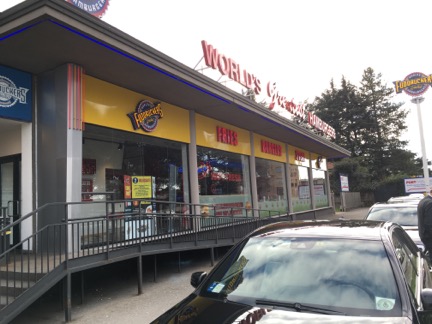
Near Milan, Italy
Japan – This is generally considered a slow growth country that has been slow for several decades. That is not true in the consumer sector, and certainly not in the burger sector, where several U.S. brands have entered recently to challenge McDonald’s 3,000 unit monopoly. Carl’s Jr.® recently announced the opening of its first restaurant in Tokyo. In this photo, Ned Lyerle, President of CKE Restaurants International, is on the right, along with our company’s Japan Associate, Ichiro (Roy) Fujita.

Carl’s Jr.®
Philippines – In December 2015 it was announced that Denny’s® has signed a license agreement with the Bistro Group, who also is the Philippines licensee for TGI Friday’s® and Buffalo Wild Wings®. The first Denny’s® restaurant in the Philippines will open in Manila in mid-2016. The Philippine economy is expected to grow at 6.5% in 2016. U.S. food franchise brands are greatly desired.

Poland – This is the one country in Europe where GDP growth did not turn negative between 2008-2012. This year the country’s economy is expected to grow at 3.1%, the highest in the European Union. This is driven almost entirely by consumer spending.
International Dairy Queen entered Europe last year. This 75-year old brand, with 6,500 stores in 28 countries, now has three stores in Warsaw. Yes, the iconic Blizzard® is present in Poland and selling well, even in the winter!
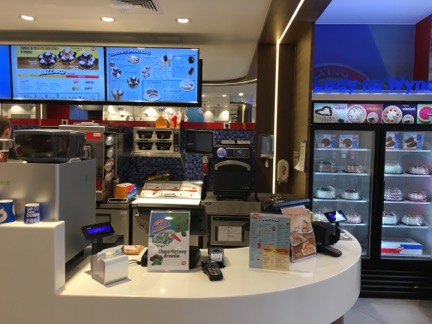
International Dairy Queen
Turkey – Two years ago, Build-A-Bear Workshop®, the world’s largest children’s entertainment retail brand, opened its first store in Istanbul. Today there are three stores in Istanbul and one in Ankara. Turkish families love to spend money on their kids and Build-A-Bear Workshop® helps!

Build-A-Bear Workshop®
United Arab Emirates – The UAE continues to see annual Gross Domestic Product (GDP) growth in excess of 3% per year. Dubai is the center of tourism and financial business in the region. New U.S. food brands are continuing to enter this lucrative market.
In December 2015, Denny’s® opened its first restaurants in the Middle East in Dubai. In this picture are John Miller, the CEO of Denny’s®, and Steve Dunn, The Denny’s® Global Chief Development Officer.
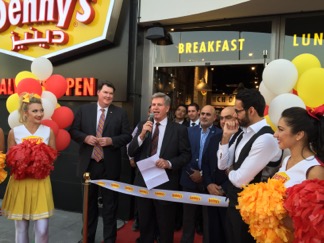
Denny’s®
Vietnam – With a GDP annual growth rate of over 6% and a very fast growing middle class consumer market, Vietnam is one of the top developing markets in Asia. U.S. franchise brands are highly desired. Recently our company finalized the country license for PJ’s Coffee of New Orleans® to open 10 or more high end coffee shops in Vietnam over the next 5-7 years. Vietnamese are very big coffee drinkers and love the social aspects of meeting for coffee and pastries with their friends.

The Fastest 2 Minutes in International Franchising
Our GlobalTeam™ of highly experienced international specialists on the ground in 32 countries contributed to the following brief summary of the franchise world opportunities for 1st quarter 2016. Countries to watch for franchise opportunities in 2016: Argentina, the Philippines, the UAE, Spain, Poland and Peru.
| Asia | China Japan Malaysia The Philippines Thailand Viet Nam |
Consumer economy growing at 8.2% per year Only large corporations are investing in new projects Political unrest, declining Foreign Direct Investment Many new US F&B brands opening 4% GDP growth expected in 2016 6.5% GDP growth, prefer US franchise brands |
| Americas | Argentina Brazil Canada Chile Colombia Mexico Peru USA |
Dramatic change, new positive government Economy is stalled, inflation climbing, political uncertainty Declining investment in F&B, tax focused new government 3.7% GDP growth for 2016. Government regulations? Show me the money and where it came from Mexico City, Monterrey and Cancun booming Lima is a city of cranes and new foreign franchises US$15/hour minimum wage kills margins. Election year |
| Europe | Ireland Germany Poland Russia Spain Turkey United Kingdom |
GDP growth of 3.5% projected for 2016 Difficult to find investors/risk takers for new foreign brands 3%+ GDP growth for 2016. Slow new franchise investment Not now 2.7% GDP growth for 2016. Recovery speeding up Political unrest leading to drop in new project investment 2.2% GDP growth, but normal investment analysis paralysis |
| Middle East | Egypt Saudi Arabia Dubai |
Pent-up consumer demand, high growth, iffy security Challenges to get new businesses open due to regulations New building push, large expat influx, airport & airline soaring |
| Elsewhere | Australia India South Africa |
GDP growth of 2.5% but falling commodity exports. Jobs iffy? Not another country, another universe. But opportunities. Low growth, high unemployment (25%), low new investment |
The Fastest 2 Minutes in International Business
Our GlobalTeam™ of highly experienced international project managers – on the ground in 32 countries – contributed to the following brief summary of the franchise world opportunities for 4th quarter 2015.
| Asia | China Japan Malaysia Mongolia The Philippines Thailand Viet Nam |
Watch the consumer economy not the overall GDP growth. Large corporations are investing in new consumer projects. Ringgit drop of 25% against the US$ plus political unrest. US pizza and coffee franchises flourishing. Seriously. Middle class buying power accelerating. Stable politics. Military dictatorships often are stable. US sailors on shore leave, 6%+ GDP growth. |
| Americas | Argentina Brazil Canada Chile Colombia Mexico Peru USA |
You still get paid in soybeans, if at all. Economy is stalled, inflation climbing, corruption rife. Tim Horton’s and Burger King are now one??? New President negative on business. Investment stopped. Show me the money and where it came from. Mexico City, Monterrey and Cancun booming. Lima is a city of cranes and new foreign F&B brands. US$15/hour minimum wage means no margins, less jobs. |
| Europe | Ireland Germany Poland Russia Spain Turkey United Kingdom |
GDP growth of 3.5% projected for 2016. Difficult to find investors/risk takers for new foreign brands. 3.5% GDP growth for 2015 is the highest in the EU. Foreign brands with US$ denominated rents are closed GDP growth for 2016 estimated to be 2.6%. Political unrest leading to drop in new project investment. 2.4% GDP growth, but normal investment analysis paralysis. |
| Middle East | Egypt Saudi Arabia Dubai |
Pent up consumer demand, high growth but scary security. Challenges to get new businesses open due to regulations. New building push, large expat influx, airport & airline soaring. |
| Elsewhere | Australia India South Africa |
GDP growth of 2.6% but falling commodity exports. Jobs iffy? Not another country, another universe. Low growth, high unemployment (25%), low new investment |
